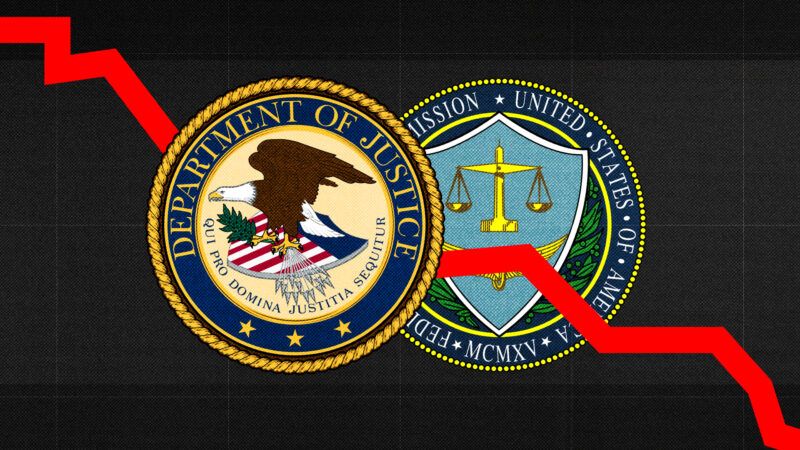Biden's Antitrust Crackdown Stifled Innovation
Antitrust scrutiny of startup acquisitions led to fewer deals and less venture capital funding.

The aggressive antitrust approach adopted by the Federal Trade Commission (FTC) and the Department of Justice's (DOJ) antitrust division during the Biden administration reduced startup acquisitions and venture capital investment, according to a recent study by the Computer and Communications Industry Association (CCIA).
During the Biden administration, the FTC and DOJ adopted a neo-Brandeisian approach to antitrust, where stopping businesses from becoming too big was prioritized over the consumer welfare standard that had characterized antitrust law since the late 1970s. This led the agencies to bring lawsuits against Big Tech and other large firms for behavior that did not clearly harm consumers. In the last two months of Joe Biden's presidency, the FTC sued Southern Glazer's and PepsiCo for violating the Robinson-Patman Act, a 1936 law outlawing price discrimination that hadn't been invoked in two decades. Meanwhile, the DOJ won a lawsuit against Google, claiming it had monopolized the search engine market and recommending the company's divestiture from Chrome and Android.
Federal antitrust enforcers pursued litigation against large firms not only for vertical integration and alleged price discrimination but for mergers and acquisitions as well. The FTC and DOJ boasted about filing "50 merger enforcement actions…the highest level of enforcement activity in over 20 years," in their 2022 annual report.
Though the agencies did not win all of these suits, they had the desired effect of dissuading larger firms from purchasing startups by increasing compliance costs. J.P. Morgan's Head of Research Ginger Chambless concluded in the National Venture Capital Association's Q3 2024 Venture Monitor that "increased regulation and antitrust enforcement have effectively sidelined the largest technology companies from [mergers and acquisitions] activity."
The CCIA report explains that the FTC and DOJ were concerned that Big Tech acquisitions of startups would discourage venture capital funds from financing them. But what discourages funds from investing are low returns, which is exactly what the shift to Neo-Brandeisian antitrust enforcement did. Median exit multiples for tech startups fell by an order of magnitude as the share of acquisitions by candidate companies—Google, Apple, Facebook, Amazon, Microsoft, and 14 other large firms targeted by antitrust enforcers—shrank from 3.4 percent to 0.9 percent. Meanwhile, early and late-stage American venture capital investments decreased from nearly $250 billion in 2021 to around $125 billion in 2023.
Venture capital funds make a profit by investing in startups that have profitable exits, which is most commonly done by being acquired by a larger firm. Expecting "Little Tech" to have profitable exits by going public is unrealistic; "the median startup IPO has more than 25 times the value of the median acquisition at the time of exit" and "79 percent [of startups] were acquired for under $50 million or were money-losing acquisitions," per CCIA.
Discouraging large firms from acquiring startups that lack viable exit options does not further competition or enhance consumer welfare. Instead of the technology being incorporated into a larger business or a standalone competitor, the startup shuts down and consumers are robbed of the chance to enjoy a valuable invention. With Biden-era antitrust enforcement (hopefully) behind us, America will be able to innovate and grow faster.


Show Comments (4)